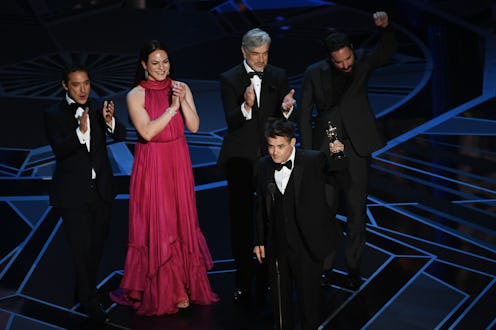
At the 90th annual Academy Awards on Sunday, the film A Fantastic Woman became the first-ever trans-storyline movie to win an Oscar. The film is also the first one featuring an openly trans actress in the lead role to secure the coveted award.
A Fantastic Woman won the "Best Foreign Language Film" award. The Chilean film was directed by Sebastián Lelio and featured transgender actress Daniela Vega in the lead role. It tells the story of a trans waitress and singer who is mourning the loss of her significant other while also enduring criticism from his family — criticism that seemingly stems from her status as a transgender woman.
Sunday's victory also marks the first ever time that a Chilean film has won in the Best Foreign Language Film category. During his acceptance speech for the award, Director Sebastián Lelio noted his gratitude to the cast, saying, "I want to thank the cast of the film, especially the brilliant actor Francisco and the inspiration for this movie, Daniela Vega. This film was made by a lot of friends and artists. I share this with all of you tonight."
In February, The Atlantic reported in a review of the film that Lelio, who co-wrote the script along with Gonzalo Maza, designed the plot of the film around Vega's own experiences as a transgender woman. The film received high praise from critics, with David Sims of The Atlantic writing,
The result[ing film] is an exploration of a life that can be difficult or unfair, but also (as we see in those early scenes) wonderful, a full life that belongs to her until outsiders try to disrupt it out of bigotry, or jealousy, or simple resentment.
Peter Bradshaw of The Guardian also gave the film high marks, calling it a "sublime study of love, loss, and the transgender experience." In his review, Bradshaw also pointedly described the way in which society threatens the main character Marina Vidal's existence as a transgender woman following the death of her lover, Orlando. He noted that the film brings important attention to issues faced by transgender individuals when their rights are not recognized. As Bradshaw put it:
[Director] Lelio shows how this grim event [the death of Marina's lover] brings all the conformism and cruelty of society into vivid focus. It was there all along of course, but it didn’t matter as long as her relationship ... protected her. At a single stroke, Marina’s whole existence is pathologised and criminalised. She has no rights as Orlando’s girlfriend; she must vacate his flat and isn’t welcome at the funeral. His [Orlando's] ex-wife and son do not conceal their hostility, and she suffers threats and assault from a brutish family member. Officials insist on calling her “Daniel” and the police think that Orlando got his wounds from Marina ... Her existence is on trial.
Beyond A Fantastic Woman's ground-breaking victory, others also made history for the LGBT community at Sunday's Oscar ceremony as well. The film's star, Vega, became the first-ever openly transgender person to serve as a presenter at the Oscars. In introducing a performance of "Mystery of Love" from Call Me By Your Name (an Oscar nominee for "Best Original Song"), Vega said, “Thank you so much for this moment ... I want to invite you to open your hearts and your feelings to feel the reality, to feel love. Can you feel it?”
In addition to A Fantastic Woman and Vega's historic Oscar moments, the director of Strong Island, Yance Ford, also made his mark at the awards ceremony, as he was the first-ever openly transgender director to be nominated for an Academy Award.
The 90th annual Academy Awards certainly seemed to be history in the making for transgender entertainers — and beyond. Hopefully these achievements have set the stage for even further recognition and celebration of transgender artists' work.